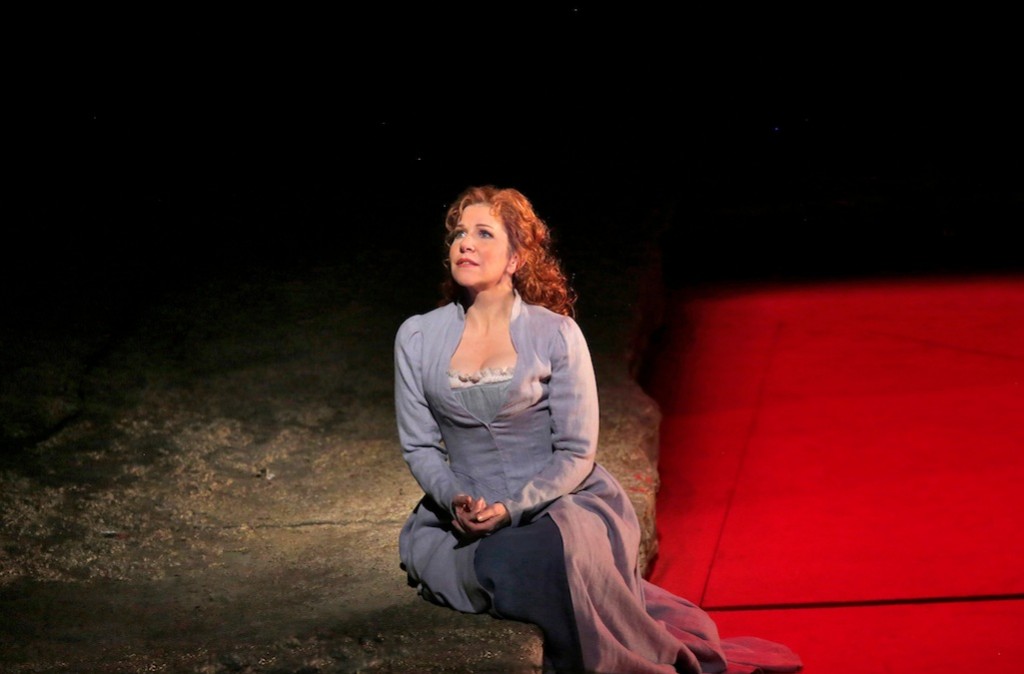DiDonato triumphs over dismal staging in Met’s “Donna del Lago”

Joyce DiDonato is Elena in Rossini’s “La Donna del Lago” at the Metropolitan Opera. Photo: Ken Howard
When Paul Curran’s production of La Donna del Lago opened at Santa Fe Opera in 2013, it was met with widespread acclaim. His simple, hillside set capitalized on the festival’s outdoor setting, leaving the back of the stage completely open and using the natural beauty of the New Mexico landscape to evoke the Scottish Highlands au plein air. It must have been lovely to behold.
At the Metropolitan Opera, alas, that particular feat of theatrical magic is impossible, and the most inventive solution the production team could come up with was to project scenes of sunset and evening onto the rear scrim. The Met’s version of the co-production, which opened at the house on Monday, is reduced to an enormous mound of dirt in front of screensaver-worthy twilight footage, a lazy bit of “stagecraft.” It doesn’t help matters that the image that dominates the final scene of Act I, that of a trio of burning crosses on the hill, bears a very different significance to an American audience than it likely does to the Scottish director.
It’s especially a shame since Rossini’s opera, which had its long-overdue company premiere on Monday, is a masterful collection of bel canto riches. And without any Zeffirellis or Schenks to live up to, it might have offered a blank slate to a director willing to take a bold approach. Curran’s production, rather, with its sudden-materializing cabin, quivering druids, and slick but bland throne room, resides somewhere near the intersection of Braveheart, The Sound of Music, and Little House on the Prairie.
In Andrea Leone Tottola’s libretto, based on Sir Walter Scott’s Lady of the Lake, the titular heroine, Elena, is torn in various directions by various suitors, duty to her father, duty to country, and duty to king. She eventually winds up with her beloved Malcolm, but must first navigate the turmoil of her father Duglas’s uprising while rebuffing the advances of both the rebel Rodrigo and the loyalist Uberto (actually King James V in an apparently cunning disguise).
From all of this confusion, Joyce DiDonato emerges triumphant. It doesn’t take much courage to tell the listening public that DiDonato is among the world’s greatest singing actors of any voice type; on Monday she was beyond perfect. Given the opportunity to introduce a major role to the Met’s audience, she gave a performance that may ultimately stand as a high point in her already lofty career. What we heard was one of the world’s best voices in top form—her tone was pure honey, her coloratura effortlessly fluttering, her ornamentation fearless.
The highlights of DiDonato’s performance are too many to list, but if I had to choose just one, it would be the sparkling rondo “Tanti affetti” and the ensuing finale. Her soaring, glowing sound and bursting joy inspired awe, salvaging a happy ending for everyone involved. And she did not settle for mere vocal prettiness, instead tracing a gigantic arc from dutiful innocent to hardened woman, refusing by the end to take any nonsense from anyone.
Juan Diego Flórez, no slouch himself, was energetic and passionate as ever in his portrayal of the masquerading young warrior-king. His molten-gold voice was in excellent form, even if it took on a slightly hard edge in his show-stopping cavatina, “O fiamma soave.” This scene, incidentally, was one of the staging’s few enlightened moments—a small forest of heads on pikes seemed a gruesomely humorous comment on the incongruity between the opera’s florid writing and its violent scenario.
John Osborn’s voice may feel just a tad heavy for the role of Rodrigo, but his ability to go toe-to-toe with Flórez in a duel on the high C’s served as icing on what was otherwise a solidly portrayed and admirably sung performance. Oren Gradus was difficult to hear as Duglas, and, in another peculiar directorial choice, he came off as a callous brute motivated more by his fondness for malts than by any desire to defend his rights as a nobleman. Daniela Barcellona took some time to relax into the trouser-role of Malcolm, her vibrato initially sounding too wide for the rep, but she ultimately hit her stride with a subdued but moving rendition of her lament “Ah! si pera.”
Monday was one of the stronger showings in Michele Mariotti’s still-young Met career. The orchestra, under his baton, was crisp and lively, gurgling its way to an enchanting account of this glittering score. Ever obliging, he failed to give Flórez the nudge he needed to keep the energy up in his cavatina—the gumption to challenge a superstar’s tempo is the sort of quality that might come with age.
This production stands out as a curious misstep in what has otherwise been a thrilling season at the Met. With the benefit of hindsight, it’s hard to see how a staging designed for two such different venues as Santa Fe and the Met could ever work at both. The audience on Monday were none too pleased, voicing their displeasure with Curran and his team at the curtain call. Nonetheless, opera lovers should sprint to the house to hear Joyce DiDonato’s performance; it’s more than worth enduring the maladroit staging.
La Donna del Lago runs through March 14 at the Metropolitan Opera. metopera.org